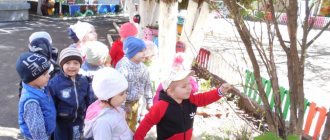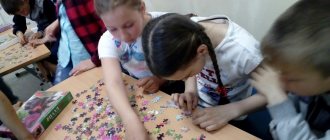Goals and objectives of environmental education of preschool children in interaction with parents
Preschool age is a unique period in the comprehensive development and formation of a child’s personality.
Properly organized environmental education is of great importance, allowing one to lay the foundations for a positive attitude towards the surrounding nature and the world. In preschool age, the child begins to gradually distinguish himself from the environment, realizes his “I”, he develops an emotional and value-based attitude towards the people around him, the foundation of a moral and ecological position is formed, which later manifests itself in the process of the child’s interaction with nature and the awareness of inseparability with her. That is why it is very important to begin as early as possible to develop in children primary knowledge of the rules and norms of behavior in nature, interaction with it, and to cultivate empathy for environmental problems and their solutions. Are you an expert in this subject area? We invite you to become the author of the Directory Working Conditions
Accumulating knowledge in the field of nature and ecology in preschool children is not an end in itself. Knowledge is one of the necessary conditions for a child to develop an effective, emotional and moral attitude towards the world around him.
Note 1
The goal of environmental education of children in preschool educational institutions is the formation of the principles of environmental culture and the development of environmental thinking and consciousness, a responsible attitude towards the environment.
Achieving this goal involves compliance with the legal and moral principles of environmental education, which are based on:
- Promoting conservation
- Active activities in the study of environmental protection
- Formation of a respectful attitude towards the nature of the Native Land
Nature, within the framework of environmental education, is understood not only as the external environment, but also as the inner world of man, since he is part of this nature.
Achieving the goal of environmental education involves solving a number of problems:
Finished works on a similar topic
Coursework Work with parents on environmental education of preschoolers 470 ₽ Abstract Work with parents on environmental education of preschoolers 280 ₽ Test work Work with parents on environmental education of preschoolers 250 ₽
Receive completed work or specialist advice on your educational project Find out the cost
- Educational objectives are aimed at developing ideas and knowledge about existing environmental problems and possible ways to solve (prevent) them.
- Educational objectives are aimed at developing motives, habits and needs for environmental activities and environmental behavior, as well as healthy lifestyle.
- Developmental tasks - aimed at developing practical and intellectual skills in studying and assessing the state of the environment, as well as developing the desire for active environmental protection activities.
A kindergarten is one of the first links in the system of continuous environmental education and training of children, which is why teachers of preschool educational institutions are faced with the task of forming in children the foundations of environmental culture and rational use of natural resources.
Note 2
Environmental education of preschool children, carried out in kindergarten through the entire pedagogical process, which involves working with children in the classroom and in everyday life.





